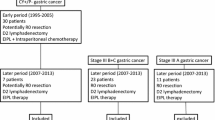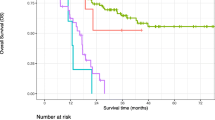Abstract
Background
Initial chemotherapy (Initial-C) followed by surgery is a promising treatment strategy for peritoneal lavage cytology-positive gastric cancer (CY1 GC) with no other noncurative factors. The aim of this study was to investigate the survival advantage of Initial-C compared to initial surgery (Initial-S) for this disease according to the macroscopic type, which was associated with prognosis and the efficacy of chemotherapy in GC.
Methods
One hundred eighty-nine patients who were diagnosed with CY1 GC with no other noncurative factors at four institutions from January 2007 to December 2018 were enrolled. The patients were divided into a macroscopic type 4 group (N = 48) and a non-type 4 group (N = 141). The influence of initial treatment on overall survival (OS) in each group was evaluated.
Results
In the type 4 group, the 5-year OS rates of Initial-C (N = 35) and Initial-S (N = 13) were 11.6% and 0%, respectively (P = 0.801). The multivariate analysis could not show the survival advantage of Initial-C. In the non-type 4 group, the 5-year OS rates of Initial-C (N = 41) and Initial-S (N = 100) were 48.4% and 29.0%, respectively (P = 0.020). The multivariate analysis revealed that Initial-C was independently associated with prolonged OS (hazard ratio, 0.591; 95% confidence interval, 0.375–0.933: P = 0.023).
Conclusions
Initial-C improves the prognosis of non-type 4 CY1 GC with no other noncurative factors. On the other hand, further development of effective chemotherapeutic regimens and innovative treatment strategies are required for type 4 CY1 GC.




Similar content being viewed by others
References
Brierley JD, Gospodarowicz MK, Wittekind C (2017) International union against cancer (UICC) TNM classification of malignant tumours, 8th edn. John Wiley & Sons, Hoboken
Amin MB, Edge SB, Greene FL et al (2017) AJCC cancer staging manual, 8th edn. Springer, New York
Japanese Gastric Cancer Association (2011) Japanese classification of gastric carcinoma: 3rd English edition. Gastric Cancer 14:101–12
Jamel S, Markar SR, Malietzis G et al (2018) Prognostic significance of peritoneal lavage cytology in staging gastric cancer: systematic review and meta-analysis. Gastric Cancer 21:10–18
Ajani JA, D’Amico TA, Bentrem DJ et al (2022) Gastric cancer, version 2.2022, NCCN clinical practice guidelines in oncology. J Natl Compr Canc Netw 20:167–92
Lordick F, Carneiro F, Cascinu S et al (2022) ESMO clinical practice guideline for diagnosis, treatment and follow-up. Ann Oncol 33:1005–1020
Kodera Y, Ito S, Mochizuki Y et al (2012) Long term follow up of patients who were positive for peritoneal lavage cytology:fnal report from the CCOG0301 study. Gastric Cancer 15:335–337
Kano Y, Ichikawa H, Hanyu T et al (2022) Conversion surgery for stage IV gastric cancer: a multicenter retrospective study. BMC Surg 14(22):428
Solaini L, Ministrini S, Bencivenga M et al (2019) Conversion gastrectomy for stage IV unresectable gastric cancer: a IRCG retrospective cohort study. Gastric Cancer 22:1285–1293
Yoshida K, Yasufuku I, Terashima M et al (2021) CONVO-GC-1 study group, federation of Asian clinical oncology (FACO). International retrospective cohort study of conversion therapy for stage IV gastric cancer 1 (CONVO-GC-1). Ann Gastroenterol Surg 6:227–40
Yamaguchi K, Yoshida K, Tanahashi T et al (2018) The long-term survival of stage IV gastric cancer patients with conversion therapy. Gastric Cancer 21:315–323
Yasufuku I, Nunobe S, Ida S et al (2020) Conversion therapy for peritoneal lavage cytology-positive type 4 and large type 3 gastric cancer patients selected as candidates for R0 resection by diagnostic staging laparoscopy. Gastric Cancer 23:319–327
Aizawa M, Nashimoto A, Yabusaki H et al (2015) The clinical significance of potentially curative resection for gastric cancer following the clearance of free cancer cells in the peritoneal cavity by induction chemotherapy. Surg Today 45:611–617
Nakamura M, Ojima T, Nakamori M et al (2019) Conversion surgery for gastric cancer with peritoneal metastasis based on the diagnosis of second-look staging laparoscopy. J Gastrointest Surg 23:1758–1766
Yamaguchi T, Takashima A, Nagashima K et al (2021) Impact of preoperative chemotherapy as initial treatment for advanced gastric cancer with peritoneal metastasis limited to positive peritoneal lavage cytology (CY1) or localized peritoneal metastasis (P1a): a multi-institutional retrospective study. Gastric Cancer 24:701–709
Bollschweiler E, Boettcher K, Hoelscher AH et al (1993) Is the prognosis for Japanese and German patients with gastric cancer really different? Cancer 71:2918–2925
Blackham AU, Swords DS, Levine EA et al (2016) Is linitis plastica a contraindication for surgical resection: a multi-institution study of the U.S. Gastric cancer collaborative. Ann Surg Oncol 23:1203–11
An JY, Kang TH, Choi MG et al (2008) Borrmann type IV: an independent prognostic factor for survival in gastric cancer. J Gastrointest Surg 12:1364–1369
Song XH, Zhang WH, Kai Liu et al (2020) Prognostic impact of Borrmann classification on advanced gastric cancer: a retrospective cohort from a single institution in western China. World J Surg Oncol 18:204
Eba J, Nakamura K (2022) Overview of the ethical guidelines for medical and biological research involving human subjects in Japan. Jpn J Clin Oncol 52:539–544
Japanese Gastric Cancer Association (2021) Japanese gastric cancer treatment guidelines 2018. Gastric Cancer 24:1–21
Dindo D, Demartines N, Clavien PA (2004) Classification of surgical complications: a new proposal with evaluation in a cohort of 6336 patients and results of a survey. Ann Surg 240:205–213
Smyth EC, Nilsson M, Grabsch HI et al (2020) Gastric cancer. Lancet 396:635–648
Piessen G, Messager M, Leteurtre E et al (2009) Signet ring cell histology is an independent predictor of poor prognosis in gastric adenocarcinoma regardless of tumoral clinical presentation. Ann Surg 250:878–887
Heger U, Blank S, Wiecha C et al (2014) Is preoperative chemotherapy followed by surgery the appropriate treatment for signet ring cell containing adenocarcinomas of the esophagogastric junction and stomach? Ann Surg Oncol 21:1739–1748
Koseki Y, Hatakeyama K, Terashima M et al (2023) Molecular profile of poorly cohesive gastric carcinoma with special reference to survival. Gastric Cancer 26:553–64
Fukagawa T, Katai H, Saka M et al (2010) Significance of lavage cytology in advanced gastric cancer patients. World J Surg 34:563–568
Endo S, Ikenaga M, Ohta K et al (2019) Prognostic factors for cytology-positive gastric cancer. Surg Today 49:56–64
Kano K, Aoyama T, Maezawa Y et al (2017) The survival and prognosticators of peritoneal cytology-positive gastric cancer patients who received upfront gastrectomy and subsequent S-1 chemotherapy. Int J Clin Oncol 22:887–896
Yago A, Haruta S, Ueno M et al (2022) Clinical significance of initial treatment for peritoneal lavage cytology-positive gastric cancer: outcomes according to treatment strategy. World J Surg Oncol 20:35
Kuramoto M, Shimada S, Ikeshima S et al (2009) Extensive intraoperative peritoneal lavage as a standard prophylactic strategy for peritoneal recurrence in patients with gastric carcinoma. Ann Surg 250:242–246
Yamaguchi T, Takashima A, Nagashima K et al (2020) Efficacy of postoperative chemotherapy after resection that leaves no macroscopically visible disease of gastric cancer with positive peritoneal lavage cytology (CY1) or localized peritoneum metastasis (P1a): a multicenter retrospective study. Ann Surg Oncol 27:284–292
Iwasaki Y, Terashima M, Mizusawa J et al (2021) Gastrectomy with or without neoadjuvant S-1 plus cisplatin for type 4 or large type 3 gastric cancer (JCOG0501): an open-label, phase 3, randomized controlled trial. Gastric Cancer 24:492–502
Chen GM, Yuan SQ, Nie RC et al (2020) Surgical outcome and long-term survival of conversion surgery for advanced gastric cancer. Ann Surg Oncol 27:4250–4260
Lee JH, Son SY, Lee CM et al (2014) Factors predicting peritoneal recurrence in advanced gastric cancer: implication for adjuvant intraperitoneal chemotherapy. Gastric Cancer 17:529–536
Ishigami H, Fujiwara Y, Fukushima R et al (2018) Phase III trial comparing intraperitoneal and intravenous paclitaxel plus S-1 versus cisplatin plus S-1 in patients with gastric cancer with peritoneal metastasis: PHOENIX-GC trial. J Clin Oncol 36:1922–1929
Ishigami H, Tsuji Y, Shinohara H et al (2021) Intraperitoneal chemotherapy as adjuvant or perioperative chemotherapy for patients with type 4 scirrhous gastric cancer: PHOENIX-GC2 trial. J Clin Med 10:5666
Funding
This work was supported by JSPS KAKENHI Grant Number JP22K16483.
Author information
Authors and Affiliations
Corresponding author
Ethics declarations
Conflicts of interest
The authors declare that they have no conflicts of interest.
Additional information
Publisher's Note
Springer Nature remains neutral with regard to jurisdictional claims in published maps and institutional affiliations.
About this article
Cite this article
Kano, Y., Ichikawa, H., Aizawa, M. et al. Macroscopic type is implicated in the prognostic impact of initial chemotherapy on peritoneal lavage cytology-positive gastric cancer with no other noncurative factors. Int J Clin Oncol (2024). https://doi.org/10.1007/s10147-024-02496-1
Received:
Accepted:
Published:
DOI: https://doi.org/10.1007/s10147-024-02496-1




